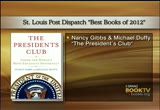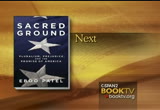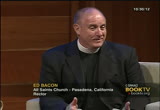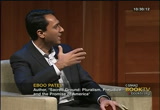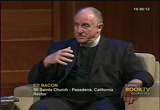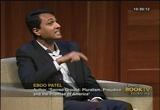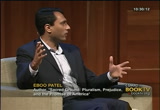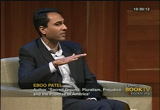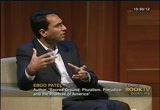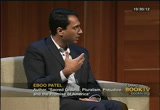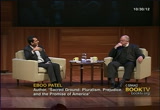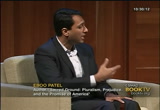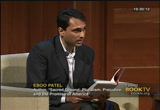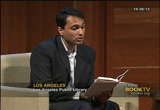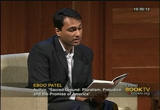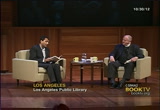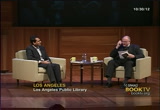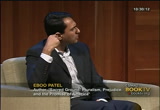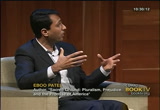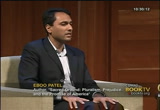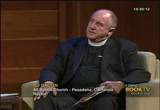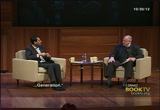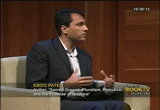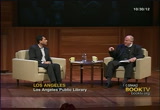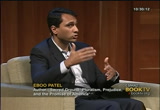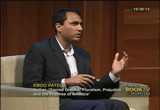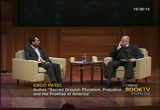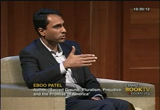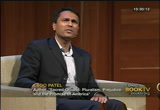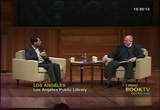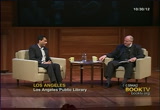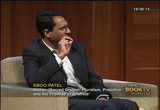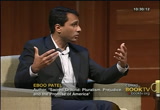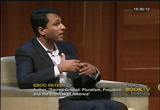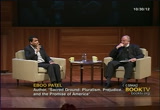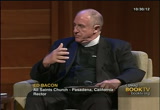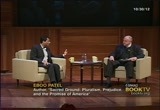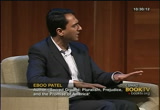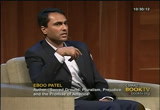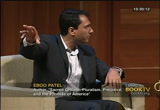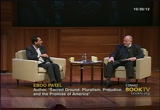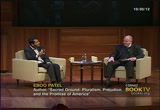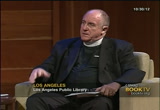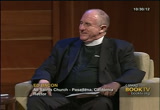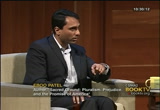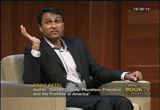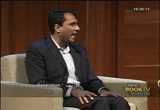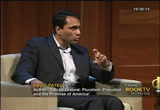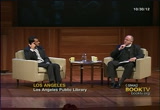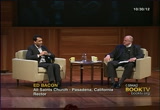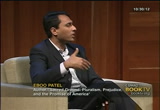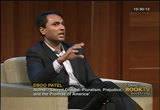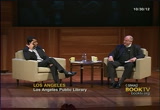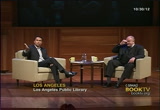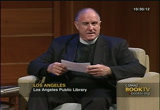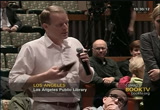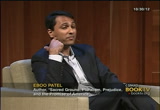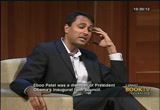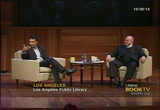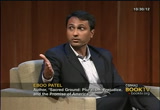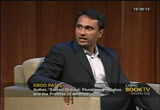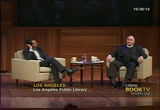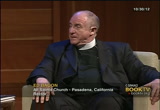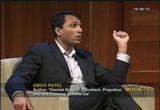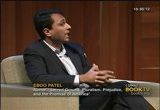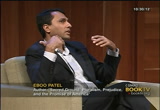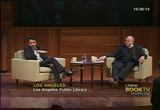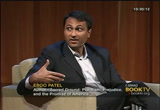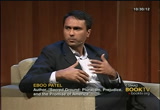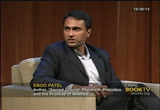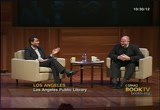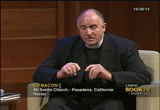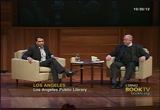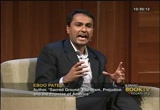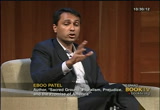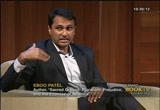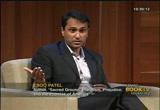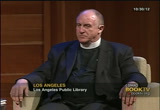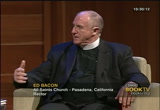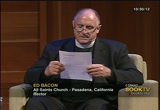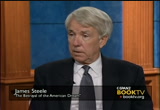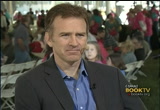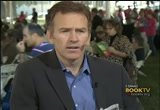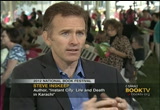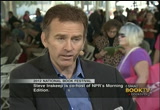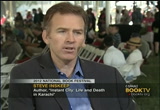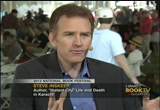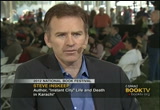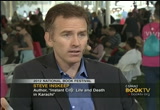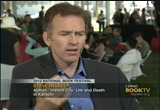tv Book TV CSPAN December 22, 2012 4:30pm-6:00pm EST
4:30 pm
presidents in the president's club, inside the world's most exclusive fraternity. and political commentator kevin phillips recounts what he believes was the most important year of the american revolution, which was 1775, a good year for revolutions. for an extended list of links to various publications, 2012 notable books elections this it the book tv website, booktv.org, or our facebook page, facebook.com/booktv. >> enter now eboo patel, a member of president obama's inaugural council argues that america should strive to be a pluralistic economy where religion is a bridge to cooperation rather than official between people. this is about an hour 20. [applause]
4:31 pm
>> good evening and thanks for being here. i am very excited to be with my newest best friend, eboo patel. i have had a wonderful time reading his book. i'm very excited about having a conversation with him and in drawing him into that -- drawing you when that conversation. one of the delights is his disclosing something of his own spiritual practice, particularly during the holy season of ramadan. he had me when he said that prior to entering the day he would get up, have his small breakfast and then have a time with a poem. one of my favorite poets. i thought it would be wonderful if we all could have a moment of centering around one of his
4:32 pm
favorite running pomes. how does that sound? all right. thank you for that invitation and thank you all for being here this is a poem that i actually first heard in turkey. come, come, whoever you are, wonder, worshiper, lover of leaving. it does not matter. ours is not a caravan of despair. come even if you have broken your vows a thousand times. come yet again. come, come. a couple of reasons this is meaningful. in the book sacred ground commanders said that this beautiful woman of welcoming , the inscription is the me your tired, pork, huddled masses. this notion of america and radical welcoming and openness. bring your traditions, plant those seeds in american soil and let them grow into institutions and into congregations that are
4:33 pm
welcoming and open to others i need to confess that i get emotional when i talk with people about the issues that we are going to be addressing tonight, particularly the issue and of interfaith relations and also the issue of the idea of america . right after september 11th several of us, lot of us gathered at a mosque here near usc, and i heard a sentence that changed my life, and it was this to be religious and the 21st century is to be into religious. it is that the vacation that draws me.
4:34 pm
so i'm going to apologize only once for being emotional about these things. if i get checked out you can chalk it up to that. one of the great moments in his book is his telling about the genesis moment for this book. >> shore. this is actually ramadan 2010 to august of that year, some walking a batter around 4:00 a.m. and having my last meal before doing my prayers'. it's at that point that i like to, as muslims to, to read more from the corona, additional time of center and indicate to the meditation. instead of people remember what is happening in august of 2010 the crazy discourse unborn.
4:35 pm
i'm not reading. i'm literally right wing heat website after right when he website trying to anticipate the storyline of the date because every day there are new attacks on the founders of cordoza house. new word about this being a terrorist command center. these are people i've known for many years and admire who have spoken of building an institution supported by the muslim community that would be of service to the entire nation. this was the fruit of their vision. and so i am basically trying to figure out, if i get called by cnn or whoever else, what am i going to say. that's when i see my name, eboo patel, muslim extremists. and i'm like, are you kidding me? candidate who founded the interfaith organization. really? and it was at that time i was
4:36 pm
teetering between anger and despair. i thought that america had entered the twilight zone happily. carnation wanted to believe the ugliest hateful most twisted lies about their religion that is 1400 years old and that has one-and-a-half billion adherents around the world. it was not a particularly happy or spiritually enhanced ramadan for me. a couple of days into it, the second week, i get a phone call from a spiritual mentor in my life and maybe the most well-known muslim preacher america, especially within muslim circles. the kind of plays a st. francis role in my life and plays the mad scientist and back to the future movies. kind of jump into my life, call me, tell me i have to read a book or go to conference and then disappear. he calls.
4:37 pm
how are you doing. i'm like, i'm doing terrible. i can't believe what's happening i can't believe that they are calling what is effectively a muslim ymca a terrorist command project. and not one to hold his fire, he says something that turns our world around. he says, you're getting this all wrong. these are the moments to be angry or despairing. these of the moments that change agents yearn for. our nation is molten and can be shaped. i was like what are you talking about? and he said, listen, we have known that there is and a clearance around islam in america. we also know that there are these really are the forces of president some who want to repeat the lies and hatred. now it's out in the open. what happens when an ugly prejudice is on the open is the
4:38 pm
better angels of american nature come out and engage those and defeat those. and you, especially the work you do at interfaith you score, you have to do your work well at this point. and then they collected he was gone. that's the mad scientist from the back to the future movies part. that to what that is when i started thinking that we actually have this really beautiful dynamic across american history where the forces of prejudice, whether peter stuyvesant in the 16 fifties of the anti-catholic and jewish forces through much of the 18th and, 19, arrow a 20th-century will turn a marginal as a community. other people who i say, the forces of pluralism, they stand up and be defeated. this was our chance to write our version of that chapter in american history by and it was actually a great honor to be a will to be a part of that. that was the beginning of the book.
4:39 pm
>> we agree that end. that leads you to an exploration of what i think is a really radical notion and a correct understanding of the essence of america, the ideal america which interestingly enough resonates with something that the profit mom said. can you talk about that. >> there is this beautiful line from the prophet mohammad that muslims follow by same piece of blessings of god be upon them. the scenes of the profit. none of you truly believe until he wants for his brother or his fellow what he wants for himself and in my mind i connect that with one of the sayings of the fourth of. [indiscernible] says a letter to is governor in egypt and says, everybody air is either your brother in fate or
4:40 pm
your equal and creation. this notion is central to both islam and america. we have to of lift up and emphasize the dimensions of our traditions that build relationships. average of cooperation rather than a barrier of division. there are powerful movements making especially faith a-bomb of destruction or barrier of division. a big part of what your about, big part of what we are about, a big part of what reverend danny fisher and the folks here from mpac and friends in this room, a big part of what they are about and what they're doing is making faces a bridge of cooperation. love to read a selection about how i think that america is a nation that this is woven into our dna in that unit as the
4:41 pm
achievement not just of the american promise, but also something really beautiful. god says, i made you different nations and tribes and you may come to know one another. we have the chance to achieve that, and i kind of right that in the final passage of the introduction of sacred ground which i will read to you. i profile many people in this book, but the main character is the one of the most, america. you will see my weakness at every turn. the nation a belong to, believe in, seek to build up. the ultimate character with a complex and inspiring past, a character whose future will be determined by the many characters to call our home. the strangest part of the debate for me was the idea of sacred ground. the people opposed insisted that the blocks create a wholly area. those who believe it ought to stay in lower manhattan like to
4:42 pm
point to the nearby strip joint and say that this patch of land is just like any other. why can't you just move it ten or 20 blocks away a cnn anchor asked me on air at the height of a controversy? that would still be sacred ground. 100 miles north, a thousand miles south, 2,000 miles west, it's all holy. i believe every inch of america is sacred from sea to shining sea. i believe we make it wholly by who we welcome and by how we relate to each other, call it my muslim eyes of the american project. we may differ nations in tribes that you may come to know one another. there is no better place on earth and america to enact that vision. it is part of the definition of our nation. i said democracy is only of use that it may pass on and come to its power in fruits and manners in the highest form of interaction between man and belief in religion, literature,
4:43 pm
college, school. pluralism is not a birthright in america, its responsibility. pluralism does not fall from the sky, it does not rise up from the ground. people have fought for pluralism people have kept the promise. america is exceptional, not because there is magic in our soil, but because there is fierce determination and our citizens. the greatness of america lies not in being more enlightened than any other nation, but rather in her ability to repair her faults. every generation has affirmed an extended the american promise. when i think of that promise that think of the christmas pageant at the catholic school and the north side of chicago where my firstborn started his education, the school is an american rainbow. african, polish, mexican, croatian, you name it, it's there all gathered at the christmas pageant.
4:44 pm
standing on the rickety stage gleefully parading about in a santa hats. talking to his friend, the chinese grow with the white mom and pakistan. i am cooling in the year of our newborn baby when the signal comes in the class starts in on their signs on. a little wobbly and first, what they catch the swing soon enough, and when they hit the course i cannot help myself. i start to sing along. i love this melody. i love this side of my sweet kid among all these other sweet kids. hammer and bring-your are i felt on my first fight in a redwood forest, the adrenaline pumping through my veins . my sons will make their own memories. one day they will realize just what it means that this land is their land and that they share it with 310 million others. it when my baby will come crying in the middle of the nine would walk up and down the hallway singing this song.
4:45 pm
a long time since i last saying is, maybe fifth grade, but the words came back easy to like they're written in the. there at the christmas pageant with my kids and my countrymen, and bursting with pride and love this is the american, a declaration of faith to our nation and to each other. [applause] >> very wonderful. redwood forest. it. >> we could sing it together probably. it book tv this year. we will spare them that. >> i want you to expand on another of my favorite moments in your book when you say, the most american thing you can do is stand up for someone else.
4:46 pm
>> one of the things said before he left and then it vanished in the thin air that day was don't focus on just the ugliness that is coming out around muslims, and this is a really ugly time. shots allegedly fired out of a kind of a mosque in buffalo, and muslim cab driver was asked if he was muslim and stabbed four times in response. there were mosque's being opposed from literally san diego the s.i., was not just this one project. my mom called me and said your kids are young. there is still time to change their names. unlike what you talking about. think of how they will be treated with muslim names. you have to give them american names. it was an ugly time.
4:47 pm
he said to me, think of all the people standing up for muslims. it was true. i want to tell just one brief story that i tell in the book, and i get choked up thinking about this. there was this young intern at interfaith youth corps, college student at the university, and the task that we had given him was to compile basically all of the most relevant media about anti muslim stuff happening during the madness, and he would hand me a file with the stories all categorized so that i could prepare for whatever media we might have the next day. it is at this time, now becoming the fall of 2010, a couple of really ugly incidents around algae p t folks, the terrible suicide at records of the young crop. the terrible beating in the bronx.
4:48 pm
somebody has me of blog post that this young man wrote, and he was an intern at the office. my interaction was basically, thanks for the file. it was a piece that he had read about imagining his own suicide. and the pills he would take, the look on his grandmother's face. turns at least a. i said to him, you know, i am stunned that at a time when folks to share your dignity are going through violent prejudice , you are spending your time in turning for free at an interfaith organization compiling new stories about prejudice against muslims. he looked at me, like 19 years old and says, and committed to an america that is free for everyone. if i want my people to be free in america, i have to build an america where everybody feels
4:49 pm
welcome, including your comedic. i thought that was so beautiful and so mature. i thought to myself, that's the most american thing that you can do. standard for people who are different. and i want muslims to stand up for him. >> wonderful. i would love to stay there. there are two or three other stores are would like for you to tell, but i see the clock and we're going to have to move on because i want you to up say a few things about your organization. and after that then i have another question just a kind of refine that. i have a muslim teacher here in los angeles, and he loves to talk about the passage from the car on that you mentioned that we have been given diversity as
4:50 pm
a gift so that we can learn from one another. >> come to know one another. >> come to know one another. he said, that is not about tolerance. it is about coming to know one another. could you take that as a kind of a launching pad? >> thank you for that. >> would you do. >> sure. so what interfaith youth corps does, this organization that i am founder and president of and what this book we hope is going to help expand the field of interfaith cooperation of which we are one organization. in some ways it tells the story of who we have been in the last couple of years at interfaith youth corps into we hope to be. and we think that interfaith cooperation ought to be a social norm in the same way that volunteerism, human rights, environmentalism, multiculturalism have all become social norms and that a particular sector, which is
4:51 pm
college campuses ought to play off rent-a-center role in that, and there are a number of reasons. campus is obviously advance in knowledge base for society. going through the multi-cultural as a movement on college campuses and the mid-1990s and how that had refrained our view of america as a nation where people from multiple communities have made contributions and helped advance the american project. the one word that we heard very little about was a religion. there was a lot of multi-cultural literacy, leaders , relationships, but very little about and to face the trustee, leaders from relations, and we think that the college campuses ought to model that for the country.
4:52 pm
they ought to advance that knowledge base of interfaith literacy, have places a burden people from different backgrounds build positive relationships with each other where you have a critical mass of interface leaders coming up that are trained under college campuses and then move to the rest of the society, but it's a hospital or law firm or seminary and bring that interface literacy and leaders to the rest of society. redefine enter faith corporation as building relationships between people who orient around religion differently. some sector has to advance the knowledge base, of what could looks like a miniature a critical mass of interface leaders. college campuses of the place that we think we can make the biggest difference. >> talk a little bit about this triangle. i think it is important for all of us to have in our mind. >> a chapter called the san 75th corporation. one of the things that i think is, as a interfaith cooperation
4:53 pm
grows command if i was in the private sector would set by interfaith. like human rights or environmental laws and it is a field that will grow dramatically. if you read any newspaper you will see a lot of blood between the black and whites. there is an unfortunate amount of that blood that is done to the soundtrack a prayer. just to give you one example of this, one of that -- the question that people are focusing on when it comes to a the transitions of muslim countries toward democracy and market economies are generally about governance and economics. frankly, there is the third key question as well which is christians, the christians and the city's of levittown build societies together? and the kurds and sinise?
4:54 pm
it will be at the question. this is the questions of how different sex and religious treatises relate to each other, one of the central questions of the 21st century. that is one of the reasons we need a really robust field of interfaith cooperation helping to make vague the bridge of cooperation rather than a barrier of division or bomb of destruction. how do we do this well. you can see this as a robust discourse within the field of education reform or poverty alleviation or in car rentals and bill read is not about doing it. it's about doing it well. part of what we have done is look through the social science research of the last ten years and religious diversity whether it is work by robert putnam at harvard or princeton or pew and galloped and brown and all the social science research and ask the question of effectiveness. what does this teach us? and what you come up with is a
4:55 pm
very simple model called the interfaith triangle. we know based on the social science research that if you know one person of a different religious background. if you have a single meaningful relationship with the mormon or in evangelical or a muslim or a jew, your attitude toward that whole community improves. in fact, we also know from the social science data that your attitude toward other religious communities improves. we also know that if you have what we call appreciative knowledge of a different religion, something as simple as being about the place of the profit mohammad within islam that your attitude towards that improves. those three things, attitude, knowledge, relationships, deeply connected. what is an effective interface program? by the way, this might sound simple and common sense and i'm very happy to say that part of a we do for a living is derivation of data that proves common sense
4:56 pm
and in this case is definitely true. you would not believe how many interfaith programs i have been to where people will choose the most divisive topic imaginable. the middle east or abortion, and it will take people on opposite ends of the poll, put them on stage and basically say, fight. and the audience leaves mad at each other and people wonder why . you're not facilitating positive , many for relationships . you're not advancing appreciative knowledge. just because you have people from different religions and a room talking about religion does not mean it's interfaith. given the way religious discourse goes in society it is a lot easier to default to arguments about divisiveness than it is to advance appreciative knowledge and meaningful relationships. an effective interface program is all or somebody walks up and
4:57 pm
says, had a conversation. added not know much about the community. frankly, i have negative views. after meeting match from that tradition i will look at that committee differently . i learned about this beautiful line from rabbi hillel. if i am only for myself who am i? if i am not for myself, who will be for me? if not know, when? that is inspiring. so a big part of what we are trying to do that interfaith youth corps is trainee critical mass of interfaith leaders on college campuses who will first start those programs on their campuses, campuses are these really inspiring micro civil societies in culture where you can take care religious study class and read a bacon or eboo patel or robert putnam and say that is an interesting way of doing interfaith cooperation. start the better to get a campaign which is what we call our interface program at
4:58 pm
interfaith youth corps and you can literally have a program going in a week. what i tell college students is the most disorienting thing for me when i cringe when from college is where are all the people running around whispering in my your heart rate my idea is. there are people on staff at college who are paid to tell students how great their ideas are. can we please give you money to help make the reality. take advantage of that. bill that knowledge base of interface leaders and learn the skills, practice running the programs , and when you become a doctor, an attorney, go in the politics, come hollywood it is a lot easier to facilitate positive, meaningful relationships to take people from different religions and advance appreciative knowledge because you facts those not muscles as in 1920 year-old college student. so we're looking to build the movement. >> you have had it for almost an years. you mentioned this, but i want
4:59 pm
to punctuate it because i think is important for those of us to appreciate the value of interfaith work, and to religious, knowledge, relationships. to hear the story of you're going to and a half castaic with a good growth stake with your friend who really caught you of short , and from year -- from my reading changed what you're doing. >> this was not a happy afternoon. this was fourth of july weekend a couple of years ago. ..
5:00 pm
5:01 pm
months, six months, nine months or 12 months later, they are not really taking action. and i said, you know, this does not sound great. that he doesn't -- instead, actually, i have a theory about this, and i said, what is your theory? he said my theory is it's your fault. [laughter] so i kind of wish i hadn't asked that question. he said the problem, eboo patel, is when you talk about interfaith cooperation from you talk about many different things. people can't and won't do a hundred different things. you have to be able to articulate an aspirational vision of this and we did people take action. and not measure your effectiveness by the applause after speeches. effectiveness is interfaith cooperation and how many people are becoming interfaith leaders, starting their own interfaith programs on college campuses and going on to vocations and interfaith leadership. not necessarily professional vocations, but part of their identity. despite human rights activist or an environmentalist or someone
5:02 pm
believes in multicultural cooperation is part of your identity, regardless of your profession. being an interfaith leader ought to be a part of your identity, whether you are a lawyer or banker or hollywood agent. that was not having the older version of this interfaith identity change happen. happened. i went for an identity change is someone as who thought, what is your cool new idea? my question now is, what are you building that's going to last? we want to build an institution that is interfaith that will last. and we want to be the next people to write the glorious story of american pluralism. you have to pay some effective attention. and that is articulating clear vision for people to take action on.
5:03 pm
so we took our a different models and took them to college campuses across the country. we are just closing one with the university of southern california were several students are being trained to build relationships between people from different faith backgrounds, including humanists, and they start something called a better together campaign. so we have a staff that are in touch with the students and support them running this together. we have gone from an organization that did 12 or 15 different things. frankly, if you earn 35 person organization doing 15 things, there's a chance you are doing them all. going to an organization but does three things. all against the hyper clear goal of making this a social norm through the sector of higher education. that wasn't transformation for me. because i used to wait my
5:04 pm
intelligence by how many times i can connect the most recent new yorker to the atlantic monthly to a tradition of contemporary america. we'll leave and say, what do i want to talk about again? what am i supposed to do? now, we want to say that we want to be in interfaith leader. we want to start programs in their campuses and communities that work is final. >> okay, so the interfaith cooperation, it may not make it to the norm. neither is having to sit down for tea and cucumber sandwiches. there has to be some protraction.
5:05 pm
looking at this group, a good many of us learned in college. [laughter] and yet we are here to learn from you. two of our lives? what about what we can do to transform america to have this in one? >> i think it's important for everybody to be in interfaith leader. we have chosen our focus on college campuses for a variety of reasons. everyone ought to be in interfaith leader. i will talk about two parts of this. one is having what i call an appreciative knowledge of other traditions. i tell a lot of stories about this in my book, "sacred ground." the practice of fasting, ramadan, your understanding of how other people's people's prayer practices connects them with the divine and the ability
5:06 pm
to find resonances between your tradition in other people's tradition. folks remember the ground zero mosque minus from a couple of years ago. there was a guy who held a sign famously adamantine muslim rally that said all i need to know about islam, i learned in 9/11. i looked at him, and i thought, well, at least you're telling the truth. right? honestly, what much of what people know about a tradition that 1.5 billion people have, it is seen as this ugly terror of 9/11. and a handful of ugly violent incidents afterwards. it's not that these things didn't happen or they were not important. they are terrible. muslims around the world have and ought to have repudiated them. they do not represent a tradition. we don't know that the deepest
5:07 pm
value of islam, for example, his mercy. devout muslims say dozens of times a day, in the name of god, we all must be ever merciful. if you treat people in a good way, it will be appreciative to you. that is the kind of knowledge that people need to have when the forces of religious presidents -- religious prejudice is loud. we don't have other knowledge of what we hear on the evening news about a religion or religion in general these days, the folks on the evening news when. and in then the second thing is the thing i call the faith of interfaith cooperation.
5:08 pm
the people who want to make faith a religious destruction, or want to create divides -- they could quote you at the tip of the tongue, where in the bible it says i can't like you were it says i have to stay separate from you. the response of those in faith communities is large, they went in. theology of religious extremism and divisiveness are highly feeling and very loud in our world today. lately, it is easy to take a couple of pieces of history here and there, and string them together and say that this is christianity. the problem is you can do that just as easily. frankly, i believe more
5:09 pm
justifiably rounded interfaith cooperation. a good part of this is devoted to the stories. so part of what i do is a good spirited story. it is maybe the archetypal christian story of somebody left for dead by the side of the road. and to people from their own interfaith community leader. the people that stop, he tells the innkeeper i will give you today's wages, and if this person needs to stay longer, i will come back and pay. he is the good samaritan. who is this american? this american is not just the marginalized person or the
5:10 pm
other. the other is religious in nature. the samaritan is someone from a different religion. the story begins by the lawyer asking jesus how i attain eternal life. so this is a story that is meant for the cosmic. there is a connection to the heavens. jesus and the story and said go and do likewise. so there is a beautiful moment woman at the center of the christian scriptures. just as there are moments at the center of islam and judaism and etc. were the founders of our faith traditions are saying, follow the ethic of the person who prays differently. someone who has beliefs that we disagree with. in this cas-someone who has bele disagree with. in this case, they someone who has beliefs that we disagree with. in this case, they are modeling the ethic better than we could ourselves. >> the default when you refer to
5:11 pm
is a very powerful moment for me about. >> there were a group of jews and christians working together. we had a particularly important moment in the senior rabbi intergroup said i am just noticing how i feel much more kinship with the people in this room than i do with some of my coreligionists. all this began to nod our heads. we have all experienced those
5:12 pm
terrorists who hijacked a religion. those terrorists that hijacked islam on 9/11. all of these guys are -- they are hijacking religion. a florida preacher that wants to burn crumbs. after you make these call for us to deeper with one another. i hear you make it call without reinterpreting the scriptures. what does your heart tell you about what you're going to do about our coreligionists and hijacked religions? >> i think that is a terrific
5:13 pm
and penetrating question. i certainly have those moments as well. i would like to push out a little bit. because i think that the work of interfaith leadership is not just about bringing people who share a lot of things into a room together, even if they pray differently. the work of interfaith leadership is actually building bridges between people who think they have very little in common. right? if we are doing the other work, i think it is important and beautiful work. but i would call it something a little bit different, personally. i would call it, say people of different religious backgrounds political progressive ideas or liberal theology. all of them are unimportant. i actually think that interfaith work is focused on something a little bit different. it is focused on people who don't think they have an awful lot in common.
5:14 pm
they orient around religion differently. the highly skilled interfaith leader has the ability to build a bridge between evangelical voting for republican candidates and an episcopalian or a jew voting for a democratic candidate who might think that they disagree on 99% of things. if by the 1% that they might agree on. this is not to be dismissive, let me be clear, other types of work to bring people from different religions together. what concerns me, is what the social science data now tells us. david campbell says 50 years ago, the divide in american society was between catholics and protestants and jews. today, the divide is between political conservatives is
5:15 pm
religion drives them to their conservatism, and secularists and liberals whose religion or secularism puts them in a category. in my view, interfaith work is furthering and deepening that poor decision. if it's not doing that, it's not doing its job. there are other movements that are bringing people together to vote for obama or articulate liberal theology. i play a role in those movements. interfaith cooperation is a civic movement that says that the american project is about people from very different backgrounds who disagree on cosmic things. huge thanks. abortion, went to javaone and the middle east. all of these things. and so will the nation together. i just have to stay at a time when people around the world from different religions disagree on cosmic things, and
5:16 pm
think that it is a reason to not build the nation together, we have to model this year. we have to be able to write the next chapter of the american project of i pray in ways that you think are wrong, and yet i call you a fellow citizen. i voted ways that you consider anathema, yet we will work together in the cleanup effort for hurricane sandy. i think about specifically focused cooperation is the center of this work. it's a very challenging thing to do. as i tell myself all the time, my personal progressivism is subsumed to focus on pluralism in my role.
5:17 pm
when we work with evangelicals and lots of them, i have huge admiration for what one would call the social capital in america. i am not leaving with my progressivism. i am leaving with dimensions of my tradition and i am saying, what can we do together? effectively, what i hope i am listing is there is a notion that there are folks out there building movements for progressivism and liberal theology that come from different religions. i think there are very few people were finding ways to build bridges in the theological perspective. that is what we hope to mobilize >> one more question and then we've opened it up. >> i think you and i have not
5:18 pm
talked about this. but i am a universalist. i have a deep respect for the atheist position. because i discovered that in my conversation with a lot of atheists, they don't believe in a god that i don't believe in. >> right. [applause] >> even if that's not the case, i think it's a very important american position into human position. you have faith in the name of the organization. would he say about this call to the brothers and sisters were a few citizens? >> okay, so couple of interesting facts. i would say a quarter of our staff would describe themselves as humanists were secularists or
5:19 pm
atheists or agnostics. 25% percent of young people in the programs within the same thing. greatly it's not because i had such a large idea. it's because the elbow their way to the table and talk a whole lot in the process. one of the things they taught me was that they have an investment in building bridges between people who orient around things differently, including themselves. that is one of the reasons i'm starting to use the language and orient around religion differently. one of the ways of doing that is human is import atheism or skepticism. it is not about whether i think it's right. part of the definition of a lot of faith commitments is thinking that you have a fullness that other people don't have. it is about finding areas of relationship. one of the folks who graduated from our program put out a great
5:20 pm
book called "fathiest." she is a humanists with 2 degrees in religion, one from the seminary, who doesn't define his humanism is anti-religious. he said they defined it as a belief that there is not a god, and that there is an animating philosophy that would call one to cooperation relationships and enrichment of people from different backgrounds. that's what he's most interested in. there are beautiful stories in this book about how he went through this kind of anti-religious faith. he was working at a lutheran sponsored nursing home in the northern part of minnesota. the person he made who made the closest friends left, this elderly man said to him at one point, will you read this for me. his eyes had gone bad and it was
5:21 pm
something he couldn't read. and chris basically had made the decision, am i going to read something that i don't believe in? the decision was yes, because i relationship with this man, and it's special to him. honestly, this is not about me. it's about him. so it's about am i going to be a friend? that is when his "fathiest" begins, so to speak. which is the ability to recognize that something is special and meaningful and powerful in someone's life. finding the dimensions of your own that will resonate with that. so i would like to tell couple of quick stories about that. one is for my dad. the reason i am in this country and my family is here is because university of notre dame led in an indian muslim student in the 1970s, my father, who died
5:22 pm
deep ever since as an irish -- fighting irish man. do you take me to notre dame at the football games and the first stop is a shrine devoted to the virgin mary. we would light a candle and set in a moment of silence there. eight or nine years old, we have been doing this for three years at this point. something occurs to me. i said, hey, dad, we are muslim, when we doing here? [laughter] my dad put his armor on the end he said, there is a verse that says god is like a lamb and he is light upon light. and he pointed to the shrine with all these flickering candles and he said, always look for the residents.
5:23 pm
so it wasn't that we agreed with this. it wasn't his thing being the same. if there is a residence resonance in our tradition, in this tradition, compare respects in this way. i find that so beautiful and so moving. so this is a big task. >> you and i have been talking about this and we love this poem. are you ready for? >> i am ready. >> i keep this in my file. he named this one among some others. >> start huge foolish product like noah. it makes absolutely no
5:24 pm
difference what people think of you. thank you everyone, thank you. [applause] >> thank you. >> let's have some questions. >> mr. eboo, i understand the importance of civil bridge building. so i don't understand why you would use the rhetoric of nationalism, which i think would bring a lot of limitations, and did you notice that the song that you like, this land is your land, is actually sung as a class-based claim for social justice. thank you.
5:25 pm
>> yes, i got think that's a great question. thank you for that. so the great stanford philosopher wrote this beautiful book called achieving our country. he begins the book by saying that i'm going to say something that folks who think politically like me generally don't like to hear. he is a political progressive. he said that he likes patriotism. i think that patriotism plays the same role in nations that self-esteem plays and individuals. it has a possibility of playing an animating role towards improvement. that is how i. one of the reasons that i am so deeply committed the american project is because i feel like an owner in this. i get to vote for the people from the government. i get to start an organization that has huge foolish project,
5:26 pm
like making interfaith cooperation a social norm. i've lived in england, i've worked in south africa, i have done work in india and kenya. i love all these places. i never felt like my hands could shape that soil. one of the things i love is how wide his vision was. i actually saw his son play that song in south africa. and he said, you know, my dad's vision for this song was always sea to shining sea, pacific to atlantic. but he knew that you have to go the long way around. so i love that. i think it is a beautiful thing to lift up the heroes of all nations. i think we ought to recognize that. >> let's go to the next question. okay?
5:27 pm
>> the things i heard the common commentators say about this last election is that faith and religion has been downplayed, because it is apparently a problem for both candidates. apparently being a mormon is a candidate problem and being a christian is something that people think is a muslim is a problem. [applause] >> yes maxa both candidates have not spoken about it. it is kind of seen as being for trade as not being able to even talk about it. >> that's a terrific question. thank you for that. although it may not be part of the explicit discourse, meaning the kind of presidential debate type stuff, there is plenty of that going on behind the scenes. just below the radar screen. both campaigns have very strong
5:28 pm
religious coalitions and efforts going on. which i think are very positive. so part of this is viewed as really positive that this campaign is a huge step towards the mainstreaming of the mormon tradition in america. and a key advancer of that are evangelical christians. one can say for a variety of reasons that relationship built on local conveniences. but you have to start somewhere. so a large community of americans -- evangelicals are 30 or 40% of americans -- they change. even their views are about catholics changed.
5:29 pm
that is a huge number. evangelical views are changing in part because of mitt romney's candidacy. the huge mainstreaming of mormons in america. i have a number of stories in this book about relationships that evangelicals are building with muslims. we talk a lot about my friend, reverend bob roberts, a southern baptist preacher who during the ground zero time, they win on went out on a limb with how supportive they were. bob roberts in deep red texas started reading matt 10 things i love about muslims. ten things i admire about islam. and i thought, why are you doing this? and he said, i am a christian, as is what i have to do. you people are in trouble, and i have to stand up for you. so i find that wonderful and he built a civic bridge with me, based on the inspiration of this tradition. that kind of stuff is going on a
5:30 pm
little bit below the radar screen. a little bit behind the scenes in both campaigns. i think it is a broadly positive thing for america. >> what you think is the biggest roadblock that your organization or interface groups are facing today? what do you think are one or two things that people can help about with relieving those were boxed. >> that's a great question, thank you for that. her questions i always ask my friend antiperspirant one of you take this one first, a quick answer. >> deepest fear that i have is a pure democracy in our country. i agree with eboo that the ideal america is one that will
5:31 pm
prevail. you alluded to the universe as one when you talk about inclusion. and i think it's absolutely right. i think the art of the universe is one towards democracy. it means people people like you and me are working to defend it. the biggest obstruction that we have a deep fear of the democracy of souls. because people don't understand that when you share power, you actually increase your power. the flickering light another candle. you don't lose like, you keep it. that's been my experience so far. do you have enough time to shape your answer? >> i think so. [laughter] >> i think we are at the beginning of a new movement.
5:32 pm
the multiculturalism movement has been built over the past 50 or 60 years. you can trace back to multiple points and jackie robinson in 1948. you can trace back to martin luther king in 1958. you can trace it back to brown versus gordon. the single most important thing that we need is people to see themselves not as participants, but as leaders. i was teaching at usc yesterday. and i'm talking about the importance of the interfaith triangle. so what he said, where are the programs that i would apply to for that? and i thought, well, you have to build those. so now, if you are a student, and you want to apply to do some international development efforts, there are hundreds of programs. but he wanted to do that 50 years ago, there were not that many. we'll built infrastructure of international development.
5:33 pm
in interceptor of culturalism. the most important thing that we need right now are people to view themselves as leaders. so right now the conversation about religion is dominated by three discourses. religion poisons everything, and the muslims are coming to get you. if that's the conversation that will continue happening, it will continue to have much to change the conversation. in order to do that, you need to have something of an appreciative knowledge of other traditions. something of a theology of interfaith cooperation or an ethic of pluralism if you are a humanist. so that you can change the conversation. so that you can start that kind of a program. it is one of the reasons that we choose to focus on college students. because it's easy to start programs on college campuses.
5:34 pm
and then there are things that go along with that. there needs to be a funding base for this movement. there is a huge funding base for religious extremism. i can't wait until the day that the major foundations in america, who currently have programs in environmentalism or human rights or, you know, general quality issues, where they say we will give away $50 million of this and education reform, where someone says i will invest $25 million in faith cooperation efforts this year. and i will focus on the ones that are showing measurable success. that is how we build the movement. but i think we ought to take -- the hill is steep or at the beginning. obviously, the climate is longer. there is a lot of beauty of the beginning to be piner about
5:35 pm
this. >> i do think it's important to say that there is an industry of islamic phobia. there is an industry of fear in this country. i think that we really need to be mindful and not be in denial about. that is simply a punctuation point is that. >> i wonder if you could remind us of the three parts of the triangle and talk about how we might implement or advance those three different principles in our daily lives. >> yes, thank you for that. relationships and knowledge and attitudes. it is based on data that shows these three things are linked. one of the waste ways comes from reading books about the stuff. she would read books that would give you an appreciative knowledge of islam or judaism or a range of religions. the nice thing is you walk into any decent bookstore and there is a pretty large selection of books like this. and relationships are -- you
5:36 pm
know, people are always asking where are the muslims in america. they are your doctors, that's a joke. and that is only partly a joke. to ask a question of our neighbors about their tradition, humanism or hinduism, i think it's a beautiful thing. the reason the question is too often i'm asked is because we think that the conversation is naturally going to veer towards decisiveness. that is because the only voices out there of the forces of divisiveness. the methodology they are simplest thing in the world.
5:37 pm
take a set of shared civic values. compassion and hospitality. service. he put them at the center of the table. and you say, tell me about what it is from your tradition that inspires you to connect to this. if a girl can answer that question. not that they could quote from the hebrew bible, but they say that my mom says her my pastor says that my sons can answer that question. my dad plays with us every night. and after the formal prayer, he says please give your easing of difficulties and compassion to those suffering in the world. muslims believe in helping those who are suffering in the world. to organize knowledge gatherings and conversations around how does your traditional belief system speak to hospitality. the beautiful thing about that, we have learned from 10 years of doing this, it invites the mutually enriching conversation
5:38 pm
rather than the mutually exclusive one. you don't have to go to -- people ask me all the time -- you are not talking about the elephant in the room. the middle east or abortion. you want to know why? there're other animals in the zoo. an opportunity often doesn't exist. but i don't want every animal to look at the open. because it's not. there are other things in muslim and jewish relations in the middle east. that doesn't mean that it's not important or doesn't exist. the conversation about the middle east is likely to be more civil and humane if we talk about the similarities between these things. the jewish notion of charity and compassion and justice. our website, we have something called the interfaith literacy quiz. that could be fun for you to do with your book group or your community or whatever it might be. i would invite folks to go to that. we also have a bunch of
5:39 pm
resources on outside that people can use. ifyc.org. >> we are wishing for new leaders to come out of this. many times to be a leader, he needs to be lonely. a lot of people that are ingrained in their religious community -- if they like the idea of interfaith cooperation, they might be siding against the community that they are in. to become lonely in that sense, to be apart from your community, how do you apply that puts these young people in college for people in the industry? >> what a tricky question. i would love to hear your thinking on that. [laughter] >> i am happy to affirm the question and to get you. >> well, it's a crucial question. i have written a book.
5:40 pm
>> i have heard. >> part of it deals with the fact that when we are leaders, we have to go through a lot of transformation ourselves. those moments of transformation really are lonely. for me, you know, this is going to be religious and spiritual and mystical. but for me, it's very important for someone to access the divinity within. for that to be your closest friends, most reliable friend. not to replace community. but to enrich the community and also to be there when your communities are oftentimes changing or making the decision whether or not we also want that community. that is one thing. the other thing is in my loneliest moments from what i have made transitions, but only
5:41 pm
religiously, but in terms of the way i think. it has been very important for me to have friends in another place. let's take eboo and me. my sense is that we we would remain friends forever. there could be lonely times that we were both are in the future. but my conviction is that reach out, this is what is going on, and you you will be there for me. a network of people that may not be immediately in our community, but get in touch through e-mail or something like that. >> thank you for that. it's one of the things that we try to do is we try to build that community. interfaith leadership institutes are when we are bringing
5:42 pm
together 150 students on campus, helping them see themselves as interfaith leaders. basically setting them up to say that this is not going to be as successful as you might it's going to be. and look around from all of these other people and campuses and no that they are going through the same thing. the panel discussion that they put six weeks into planning was attended by 10 people. but that interfaith service project.breathe out. so now that you have a network of people to improve and nurture the interfaith leadership skills. we are building that community very deliberately. we call it an identity category. environmentalists, social entrepreneurs -- we think that interfaith kind of deserves the
5:43 pm
same space. for those to say i am a christian or a buddhist or a muslim or a jew and i am in interfaith leader. close to what i was saying as well, i tell the story about audrey ellis in the book. where she is in internment couple of summers ago. i met with this group of interns and said, you have been trained to be a interfaith leader of the course of several months. and you have done service products every thursday night. we went to do a nickel back your own community. >> she goes back to her community and a couple months later she gets an e-mail that says 10 reasons why muslims can't can be american. the first one is they believe in the moon god or something like that. and we believe in allah.
5:44 pm
we always get the name right. and there are 10 reasons to write? audrey writes back that i spent the summer with a group of people from different religions and some of them are muslim. and i watch them play and they watched we pray and to build this relationship with them. i just don't think it's something that church should be doing is in this chain e-mail. and she was like, you have no idea the hate mail that i received in response. his like are you going to the macquarie university, where is your muslim lady costume? it was like, i was baptized in the church. i have been going to this church for 17 years. my staff brought this to my attention. and i was worried. i was like -- i don't want to be responsible for separating a girl from her church community or tradition.
5:45 pm
she said this has been the most difficult two weeks of my life. and she said yes, i can imagine. this is the most efficient than i could've done. it was really beautiful. she said she knows what she's doing next, she's going to the seminary. that kept her company. this notion of this is what i feel called to do. this is my tradition. this is why write so much about the american tradition of pluralism. the reason they had to be strong is because the prejudice was so ugly. but is it helpful to know that the prophet muhammad stood up for the funeral of a jew.
5:46 pm
is it helpful to know that richard von hopper said on german radio during the holocaust for those who did not stand up for the jews did not deserve a chance. the were kept company by the angels at your back. the wind of tradition at your back. it's going to be hard work. >> one of my favorite passages says the one who is with the new is greater than one who is in the world. there is a wonderful spiritual i was taught in the civil rights movement. fingerprints will treat me like they used to. since i lay my burden down. way down the burden of prejudice and narrowmindedness.
5:47 pm
it's a huge burden to lay down. there will be a time when the friends you had a special treat you like they used to. and accessing what my friend teaches me about consciousness. >> to access that. i was reading this while doing my cardio in "the new york times." and i said, it came to me. we shouldn't be burning carranza, we should be reading carranza. so we put together this program of three of my closest muslim friends and talk about what it means to me. and lalo came and spoke. i asked her why she does what she does. and she said, it is to keep my consciousness of god to alive. i think that's what we're talking about in part.
5:48 pm
keeping that a lie. would which you know will never abandon you and your friends. >> is their phone you wanted to and with? in this beautiful conversation? >> why don't you do that. >> these are yours. out beyond ideas of wrongdoing and right doing, there is a field. when the soul lies down and across, the world is too full to talk about ideas and language and even to praise each other and it doesn't make any sense. this is a great book. i hope you'll buy it. thank you all very much for being with us.
5:49 pm
[applause] >> eboo patel is the founder of the interfaith youth core. for more information visit ifyc.org.org. >> you don't always find many newspaper editors in any era embracing us. but the point that we have seen over the years is not just economics. it is the discomfort and investigative reporting. because it's troublesome. if you're going to ruffle the feathers of someone powerful, someone running into complaint to the publisher. those who will work to be really
5:50 pm
strong upright in that area. >> the pulitzer prize-winning investigative team of donald bartlett and james steele, we'll take your calls and e-mails and tweets. the co-authors of eight books. the latest of the american dream. watch live on sunday, january 6, at noon eastern on booktv on c-span2. this is booktv on c-span2. in just a few minutes, john sparrow will be talking about his new book. her from the book history 10, we have a great host of morning edition on npr. in his book, "instant city: life
5:51 pm
and death in karachi." what happened in the karachi on december 8, 2009? >> i will let you know. thank you so much for the what you guys are doing. in 2009 there was a religious procession in the middle of this gigantic mega-city. one of the megacities of the world that was bombed. it is a tragic story. but when he began digging into the details of that single day, we began peeling back the layers. when i discovered was the story that to meet women it's the way the world is developing. the way the world is growing. the weight of different kinds of people are coming together in cities. sometimes violently and thrashing out. this is an event that i learned about that became this book. >> how many people were killed? who bound to? >> about three dozen people. in the end it turned out to be, according to the authorities, a
5:52 pm
militant group. one of many militant groups that are active in pakistan. that may or may not have a variety of links to al qaeda. but in this case, they were bombing minority shia muslims. which gets to one of the themes of this book. ninety some percent muslim. in reality, it is quite diverse. there is much diversity within islam. sometimes there is a huge debate. over how the muslim world is going to handle that diversity. we see that in the news right now. the whole argument over a film depicting the profit mohammed, which has led to protests and violence and attacks from libya to egypt to pakistan in just the last few days. we see this debate over how islam is supposed to deal with dissent. how they are supposed to deal with other kinds of people. how they are supposed to deal
5:53 pm
with disagreement and also to be able to deal with insult. it was a very offensive zone. for the question is how do you respond to. what do you do about that? this was on my mind a few years ago as i wrote this book. i felt that this is a single day that eliminates a lot of the ongoing struggles in our world. if i wanted to go there. i'm sad to say some of that some of the places and people that depicted in the book have been been caught up again in violent protests of last few days we might was the genesis of this but? you tell the story about why he wrote this book. >> i'm a reporter. i started going to the city of karachi, pakistan, in 2002. at first it was a place i passed through on my way to cover the war in afghanistan. later, i was assigned there to spend a little bit of time. i didn't like it at all. it is more than 13 million people by the most conservative effort. probably a lot more.
5:54 pm
the traffic is around us. i was originally going there to cover a court proceeding relating to the death of the wall street journalist daniel pearl. it is a scary place for a westerner to arrive. as i visited there again and again, i began to help by the architecture and layers of history and incredible speed by which the city has grown. also by the people. people that have survived a lot. keeping the city functioning. it is one of the vital points. it can be a lot of terrible things. and yet the reason that they grow is because people are coming to them from outside the city to grab a job and grab an opportunity to learn english to better their lives. this is a place of opportunity for a lot of people who go
5:55 pm
there. >> tell the airplane story of. >> airplane story? >> the woman he met on the airplane you oh, my goodness, yes. i was getting on a plane on my way to karachi during one of the reporting trips. i was changing planes and a gentleman struck up a conversation with me. so i was talking and i felt a tap on my shoulder. and it was this teenager from texas. she was of pakistani descent. she was going to karachi. she asked if i was that guy from npr. i was that guy from npr. she introduced me to her mother, who had heard a series of stories that i had done from her city, the home city back in 2008. and remember them all, remember them with incredible detail. and she said you did fine. you got the news. but there is so much more. you missed a lot, you could've gotten a lot more. i couldn't agree more. as a journalist, i go to these different places.
5:56 pm
you go to cover dramatic and developing the strength of the important thing is to go back and to get a deeper sense of the story. to try to understand what is really going on in the complicated place like that. >> do you feel that you have got to deeper sense of the story? >> i definitely got a deeper sense of the story. this is an unbelievably complicated place. i try to peel back the layers leading up to a single day. we think about the fact that there are -- it's like that saying about 7 million stories. well, you go to a city in the developing world and it's like only layers. it's a complicated place. it seems completely nonsensical until you get there. then as soon as you go away again, it uses to make sense. it is also rewarding to understand some of the dynamics. >> would you go there tomorrow until safe? >> yes, i would would go there tomorrow until say that there was reason to go.
5:57 pm
when you go there as a foreigner, even though there is all the protesting and unhappiness with america generally, when you go there as an individual, you are welcomed. there is a great culture of hospitality. there is a lot of excitement if you're a foreigner and you short. they are excited that someone is coming to me -- to meet them and i was well cared for. if you think about where you're going to go in the city, where you will spend the night. and many times there are corruptions of violence come just as there were on friday. in the end, i found in the city and many other more or less dangerous places in the world, way to go about this is simply to go. do your business, to talk to people, to go away again.
5:58 pm
you discover that the overwhelming majority of people are good people and even many who are not courteous. kaj: >> steve inskeep, something you address you're dressed as a suicide bomber. what is that? >> in some cases you discover it's not a suicide bomber at all. the incident at the center of my book appears to be a suicide bombing at first. the later it turns out not to be one. he was left in what looked like a mailbox. basically a box for other pieces of scripture to be properly disposed of. it is powerfully symbolic. you discover there are a lot of people who are using a lot of calculating techniques in order to bring disruption.
5:59 pm
suicide bombing, as terrifying as it sounds, is a lot less common than the past. they are using technology today in ways that are ever more insidious. >> what was your first book experience? you have a second book coming? >> yes, i do have a second book coming. >> congratulations. >> i'm very excited about that. it's a great thing. it's going to be domestic, it's going to involve introduction and a very significant event. in the life of the president, the guy on the 20-dollar bill. an event that everyone learns about in school, but there's a deeper section to it. i'm doing another deep dive just like i did on this one. >> what is the one thing that we all learned in school about andrew jackson? >> the trail of tears. the removal of indians from eastern united states. there's a lot more to that
143 Views
IN COLLECTIONS
CSPAN2 Television Archive
Television Archive  Television Archive News Search Service
Television Archive News Search Service 
Uploaded by TV Archive on

 Live Music Archive
Live Music Archive Librivox Free Audio
Librivox Free Audio Metropolitan Museum
Metropolitan Museum Cleveland Museum of Art
Cleveland Museum of Art Internet Arcade
Internet Arcade Console Living Room
Console Living Room Books to Borrow
Books to Borrow Open Library
Open Library TV News
TV News Understanding 9/11
Understanding 9/11